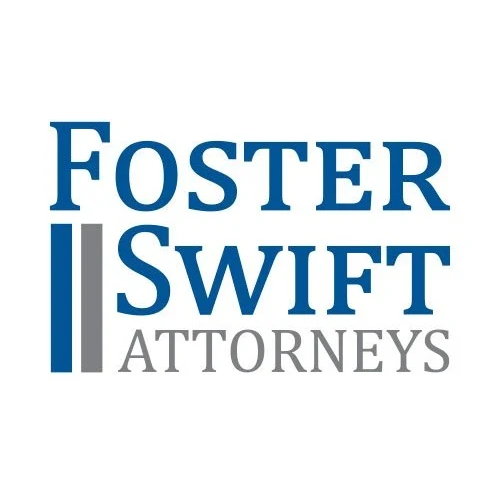 Chris Holman welcomes back Amanda J. Dernovshek, Associate, Foster Swift Collins & Smith PC, Lansing, MI with 6 offices across the state.
Chris Holman welcomes back Amanda J. Dernovshek, Associate, Foster Swift Collins & Smith PC, Lansing, MI with 6 offices across the state.
Watch Amanda and Chris discuss the Corporate Transparency Act, beneficial ownership, filing deadlines, penalties, and how to stay compliant in the YouTube video shared below:
There were several things Chris wanted to find out from Amanda in this interview:
What is the CTA and who does it impact?
(Corporate Transparency Act)
What is a beneficial owner?
What are the filing deadlines?
How do I file?
Are there penalties if I do not file?
Who can help me with this process?
» Visit MBN website: www.michiganbusinessnetwork.com/
» Watch MBN’s YouTube: www.youtube.com/@MichiganbusinessnetworkMBN
» Like MBN: www.facebook.com/mibiznetwork
» Follow MBN: twitter.com/MIBizNetwork/
» MBN Instagram: www.instagram.com/mibiznetwork/
By now, I’m sure many of you have heard about the Corporate Transparency Act and the new federal requirements enforced thereunder. If you are not familiar with the requirements, or if you are one of our clients, please read below for more information about how this may impact you.
Effective January 1, 2024, the Corporate Transparency Act (“CTA”), enacted by Congress in 2021, requires many legal entities and their beneficial owners, key executives and company applicants to disclose information to the Financial Crimes Enforcement Network (FinCEN), part of an effort to increase financial transparency and combat financial crimes. Please see below for additional details of the new filing requirements and your potential reporting obligations.
- Which entities are impacted? The CTA applies to domestic and foreign entities, including corporations, limited liability corporations (LLCs), limited liability partnerships (LLPs) and similar entities. Exempt entities include banks, credit unions, SEC-reporting companies, insurance companies and registered public accounting firms. Additionally, inactive entities and large operating companies with more than $5 million in US-based gross receipts in the previous year and more than 20 US-based full-time employees do not have to report.
- Who are Reporting Companies? Entities created through a state's Secretary of State or similar office. It also includes Foreign entities registered to do business in the U.S.
- Who is a Beneficial Owner? An individual who has substantial control over or owns at least 25% of the company. Substantial control includes senior officers, those with authority over senior officers and/or the authority to appoint or remove the majority of the company’s Board of Directors and others who are important decision makers or can significantly influence the company.
- What Information must be supplied by a Reporting Company? Companies must provide legal names, addresses, jurisdiction of formation, federal taxpayer identification numbers and personal details of each beneficial owner, such as name, birthdate and identification number from a driver’s license or passport, or the beneficial owner’s FinCEN identifier number.
- How do I get a FinCEN ID? Beneficial owners can obtain a FinCEN identifier number directly from FinCEN for free https://fincenid.fincen.gov/landing. This process requires the owner to input their personal information once, and the ID number is immediately assigned. This means the owner only needs to gather and report their personal information once, and the ID number can simply be provided to each Reporting Company when requested.
- What are the additional Reporting Requirements for new companies? Entities formed on or after January 1, 2024 must file information regarding the company applicant, i.e., the person responsible for filing the document that created or registered the company.
- What is the deadline for filing your report with FinCEN? Companies formed prior to January 1, 2024 must file their initial reports no later than January 1, 2025. Entities formed after January 1, 2024 will have 90 days post-creation or registration for reporting. Entities formed after January 1, 2025 will have 30 days to file their initial Beneficial Ownership Information (“BOI”) reports.
- What are the penalties for non-compliance? Civil penalties up to $500 per day and criminal penalties, including up to two years of imprisonment and fines of up to $10,000, may be imposed for non-compliance.
- Where can you file the BOI report? Below is a link to the FinCEN online filing portal, along with additional information, support and instructions.
- Beneficial Ownership Information Reporting FAQs
- Small Entity Compliance Guide
- FinCEN ID for Individuals
- Online Filing Website
Should you require support with your filing please consult with your legal counsel or accountant for further guidance. This information is being sent solely as a courtesy to our customers and partners, however please note that Invest Detroit is unable to assist you with your filing. In addition, please note that Invest Detroit will be requiring proof of filing of your BOI report going forward for all loan, grant and investment transactions.
The information contained herein is general in nature and will not be applicable to all circumstances. Nothing contained herein shall be deemed legal advice. Please understand that the law frequently changes, and we are under no obligation to update any matters contained herein. We accept no responsibility or liability arising out of any use of the information of any matters set forth herein.
###
Since 1902, Foster Swift Collins & Smith, PC has provided comprehensive legal services to businesses, municipalities and individuals. The firm employs 100+ attorneys and over 100 support staff in five locations: Lansing, Detroit, Southfield, Grand Rapids, and Holland. In 2023, Foster Swift achieved Midsize Mansfield Certified Plus designation which recognizes law firms for the inclusivity and transparency of their leadership processes for attorneys. For more information about the firm, its attorneys, and to access recent publications, visit www.fosterswift.com.
Images courtesy of Foster Swift











.jpg)




